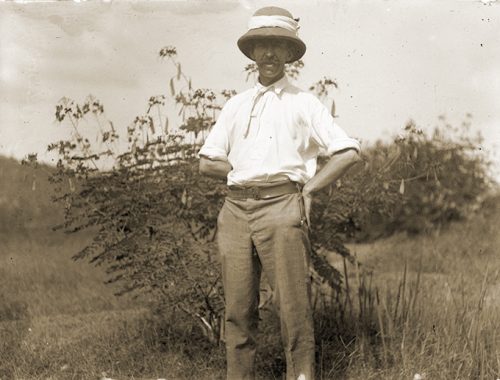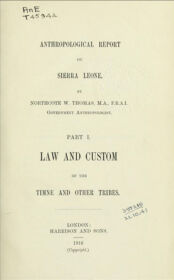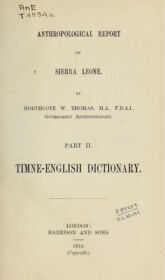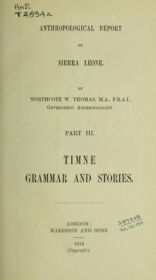
Northcote Whitridge Thomas (1868-1936) was the first trained anthropologist to be appointed to the post of ‘Government Anthropologist’ by the British Colonial Office. This appointment was an early experiment in the use of the emerging discipline of anthropology as a tool in colonial governance in the British colonial context. Unlike a subsequent generation of government anthropologists, who were members of the Colonial Service trained in anthropology, Thomas was not a colonial administrator. Rather he was engaged on a tour-by-tour basis to gather anthropological data – including information about local ‘customs and laws’ – that would be disseminated to colonial administrators and policy makers with a view to refining practices of ‘indirect rule’. In this capacity, Thomas conducted a series of anthropological surveys in Southern Nigeria and Sierra Leone between 1909 and 1915. During these tours, each between 12 and 15 months in duration, Thomas travelled extensively in the regions in which he was engaged, gathering information that he would write up in his reports, taking photographs, making sound recordings, and collecting artefacts as well as botanical specimens. Thomas was also permitted to conduct research of a more ‘scientific’ nature, so long as this did not interfere with his official responsibilities. Thus, in addition to a series of multi-volume official reports, published between 1910 and 1916, Thomas also wrote a large number of academic articles and the manuscript of an ethnographic monograph.
In the event, this experiment in colonial anthropology was not considered a success. While the endeavour was supported by the Colonial Office itself, Thomas met with considerable resistance from colonial administrators in West Africa who resented an academic anthropologist interfering in what they regarded as their jurisdiction and felt that the information he gathered was of little practical value in colonial governance. After the completion of Thomas’s fourth tour, in Sierra Leone, and partly due to the straitened economic conditions during the First World War, it was decided to discontinue the experiment. Thomas continued to publish articles on his West African research into the 1920s, but he was never again employed as a government anthropologist, nor did he succeed in securing an academic post.
Although Thomas’s anthropological research was inseparable from its colonial context, with its many power inequalities and injustices, the legacy of his survey work is a remarkably rich archival record of a moment in Nigeria’s and Sierra Leone’s history. It is the latent possibilities of this archival legacy of fieldnotes, photographs, sound recordings, artefacts and botanical specimens that the [Re:]entanglements project seeks to explore.
Thomas was a prolific author and he published over thirty books and articles relating to his fieldwork in West Africa. The multi-volume reports that were published for the Colonial Office and distributed widely to colonial administrators as well as to learned societies and universities were just one output from the surveys. They are, however, all available online by clicking on the front covers below:








For further information about N. W. Thomas and his career as a Government Anthropologist please see the article below.
Basu_N_W_Thomas_Colonial_Anthropology_Journal_of_the_Royal_Anthropological_Institute

